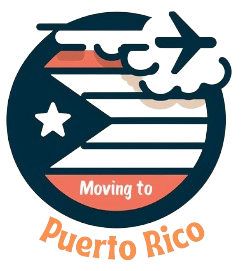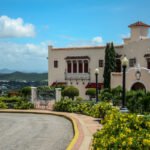Are you feeling the itch for a change of scenery, perhaps dreaming of swapping out that daily hustle for the soothing sound of ocean waves lapping on golden shores? You’re in good company.
It’s easy to be seduced by the thought of life slowing down to island time in Puerto Rico, but let’s face it — picking up your life and moving to an exotic locale comes with its share of question marks.
You might be surprised just how many folks have pondered this very move. What if I told you Puerto Rico rolls out the welcome mat with enticing incentives for those relocating from the mainland? That’s right – they’re making it even sweeter to take the plunge! We’ve done our homework so you don’t have to sweat the details.
Our guide is chock-full of insider tips on navigating expenses and getting cozy with local culture. Get ready for your Caribbean curtain call – new experiences await!
Key Takeaways
- Moving to Puerto Rico means a lower cost of living than in many places in the US, but you must meet residency rules like having a home and spending enough time on the island.
- There’s no central heating in homes because it stays warm all year. Also, most kitchens have propane stoves which are different from gas stoves on the mainland.
- Knowing Spanish is important in Puerto Rico since it’s the main language spoken there. Plus, carrying cash can be handy because not every place takes credit cards.
- When driving in Puerto Rico, use your US license at first but then get a local one after 120 days. And if you want internet or need healthcare services, check ahead as these things can vary across the island.
- To enjoy your time and fit in with locals, learn about their culture such as greetings, festivals, and family traditions. Enjoy exploring beautiful natural spots like El Yunque National Forest and stunning beaches too!
Moving to Puerto Rico

Moving to Puerto Rico requires meeting residency requirements and adjusting to a lower cost of living compared to the US. When considering housing options, it’s important to understand the different neighborhoods and property types available on the island.
Requirements for residency
Living in Puerto Rico has its perks for us Americans, and deciding to move requires knowing the residency rules. Here’s what you need to become a resident:
- First, make sure you’re a United States citizen; that’s step one.
- Live in Puerto Rico. You must spend enough time on the island to pass the Substantial Presence Test.
- Follow the Bona – Fide Resident rule. This means living in Puerto Rico during the entire tax year.
- Get a place to stay. You may need to buy a home in Puerto Rico and use it as your main house within certain time limits.
- Apply for a local driver’s license or ID card once you get there.
- Register with Puerto Rican tax authorities so everything is legal and clear.
Cost of living comparison to the Mainland
Once you’ve navigated through the residency requirements, it’s natural to wonder how far your dollar will stretch in Puerto Rico compared to the mainland US. We’ve gathered some key figures to shed light on the cost of living differences.
| Expense Category | Puerto Rico | Mainland US (Average) |
|---|---|---|
| Overall Cost of Living Index | 91.1 | 100 |
| Housing Index | 83.0 | 100 |
| Groceries Index | 97.8 | 100 |
| Restaurant Price Index | 80.2 | 100 |
| Consumer Price Index | 97.4 | 100 |
| Average Monthly Rent (1 Bedroom) | $675 | $1,250 |
| Average Monthly Utilities | $250 | $160 |
| Healthcare Index | 85.3 | 100 |
These indices illustrate that, in many aspects, your expenses in Puerto Rico could be significantly more manageable, particularly when it comes to housing and dining out. However, it’s crucial to note that utility costs can be higher, which balances out some of the savings. Keep these figures in mind as they’re reflective of the general cost of living on the island, yet individual experiences may vary depending on lifestyle and specific location within Puerto Rico.
Housing options
We have great news about finding a place to live in Puerto Rico. The island has many homes that cost less than what you’d pay back in the states. This means we can get more space or maybe even a spot near the beach without spending all our savings.
Apartments, houses, and condos are available for us to rent or buy.
Living here gives us choices from busy city life to quiet beach towns. We might choose a modern apartment with ocean views in San Juan or find a cozy house in the countryside surrounded by nature.
With lower rent prices across Puerto Rico, it’s easier for us to enjoy our dream home and still have money left for fun activities and exploring this beautiful island.
Essential Facts to Know Before Living in Puerto Rico

– When living in Puerto Rico, it’s important to be prepared for a few unique aspects of daily life. From the prevalent use of cash over credit cards to the importance of knowing Spanish, understanding these essential facts will help ease your transition into this vibrant island culture.
Use of cash over credit cards
In Puerto Rico, cash is preferred over credit cards in many places. It’s important to have cash on hand for everyday transactions like dining at local restaurants or shopping at smaller businesses.
While larger establishments may accept credit cards, it’s common for smaller vendors and street markets to only take cash. Having a good amount of cash with you can make your daily transactions smoother and more convenient.
The U.S. dollar is the official currency in Puerto Rico, making it easy for Americans to use their familiar money when living on the island. Credit cards are widely accepted, especially in tourist areas and major cities, so it’s still advisable to carry both cash and cards for flexibility in payments.
Importance of knowing Spanish
It is important to know Spanish when living in Puerto Rico as it is the official language. Understanding Spanish will help us communicate effectively and integrate into the local culture.
With an estimated 5.8 million Hispanics of Puerto Rican origin living in the United States, knowing Spanish can also facilitate interactions with a widespread community that influences US culture.
Understanding Puerto Rican Spanish’s unique qualities is essential, as communication on the island blends both Spanish and English. This knowledge will be invaluable for daily interactions, whether it’s conducting business, socializing with locals, or navigating various aspects of life in Puerto Rico.
No heating systems in homes
In Puerto Rico, there are no heating systems in homes. This is because the climate is usually warm and temperate throughout the year. Therefore, unlike in many parts of the United States, you won’t need to worry about central heating or other heating appliances in your home.
Instead, many households use solar tanks on their rooftops to heat water for everyday use.
This lack of heating systems can be a significant difference if you’re used to relying on them in the US mainland. It’s important to consider this aspect when moving to Puerto Rico, as it can affect your daily living arrangements and energy expenses.
Propane stoves with tanks in kitchens
In Puerto Rico, most kitchens feature propane stoves with tanks, unlike natural gas stoves connected to underground gas lines like in the mainland United States. Propane is a more efficient energy source than electricity and is considered nontoxic.
However, families living in Puerto Rico should be cautious about potential hazards related to propane stoves and tanks inside their homes. It’s important for consumers relocating to Puerto Rico to understand the differences between natural gas and propane when shopping for gas stoves or grills.
Now let’s look at some essential tips for expats living in Puerto Rico.
Living in Puerto Rico: What to Expect
Living in Puerto Rico offers a lower cost of living, reliable internet connectivity, access to healthcare, high standard of education, and beautiful weather.
Lower cost of living
Living in Puerto Rico offers the benefit of a generally lower cost of living compared to the mainland US. This is especially evident across various aspects such as groceries, dining out, and housing.
It’s worth noting that this lower cost of living can vary across different parts of the island, but overall, it presents a significant advantage for those looking to relocate from the United States.
In fact, when compared to many other Caribbean islands, Puerto Rico stands out with its relatively affordable expenses which can be particularly attractive for those considering an international move.
Reliable internet connectivity
Puerto Rico has varying levels of internet connectivity, with some areas having good service while others may experience disruptions. The satellite-based Starlink system by SpaceX is anticipated to significantly improve internet access across the island.
Before Hurricane Maria, the cable internet provided by Liberty was reliable in many areas. However, Puerto Rico still faces challenges with consistent connectivity, making it important for potential residents to research specific locations for reliable internet options before moving.
Furthermore, considering the increasing reliance on digital communication and remote work opportunities, ensuring a stable internet connection is crucial for Americans relocating to Puerto Rico.
Access to healthcare
Living in Puerto Rico, you can expect a different healthcare system compared to the United States. It’s important to note that expats in Puerto Rico experience shorter waiting times for private healthcare, which is generally of high quality.
However, it’s recommended for expats living in Puerto Rico to have medical insurance due to variations and potential challenges within the healthcare system. Despite being home to over 3 million American citizens, lower federal funding for Medicaid has historically been a challenge for Puerto Ricans.
Additionally, transportation problems may hinder some residents’ access to medical care.
High standard of education
Moving on from discussing access to healthcare, it’s important to note that Puerto Rico also offers a high standard of education. 60% of the population has at least a high school degree, and there are excellent private schools providing quality education for children.
High-quality education in Puerto Rico has been linked to better cognitive function later in life.
In addition, 18.3% of the population holds a bachelor’s degree or higher, indicating the availability of advanced educational opportunities. This is essential information for those considering relocating to Puerto Rico, especially if they have children or are looking to further their own education.
Beautiful weather
After considering the high standard of education on the island, it’s essential to mention another major perk of living in Puerto Rico – the beautiful weather. You can expect a warm and tropical climate, making it perfect for enjoying the beaches and rivers year-round.
The temperature typically fluctuates between 76°F and 88°F throughout most of the year, and even on hot days, the weather is generally breezy rather than very humid. This makes the heat pleasantly enjoyable while still allowing you to engage in various outdoor activities at any time.
Moreover, with a climate that is sunny, hot, and humid for most of the year, expats moving to Puerto Rico will find themselves surrounded by stunning natural scenery ranging from mountainous landscapes to tropical beaches.
Essential Tips for Expats Living in Puerto Rico
– Driving and obtaining a driver’s license can be a bit different in Puerto Rico, so it’s important to understand the process before hitting the road. Setting up a bank account, navigating moving company operations, and familiarizing yourself with the island’s culture and customs are also essential aspects to consider for expats living in Puerto Rico.
Driving and obtaining a driver’s license
Moving to Puerto Rico, we can use our US driver’s license to drive there. After 120 days of living in Puerto Rico, we must obtain a local driver’s license. The government recently announced that the licenses will now read “Puerto Rico USA” on top. To legally drive on the island, it’s important for expats to understand the process of obtaining a Puerto Rico driver’s license.
- Visit the local Department of Motor Vehicles (DMV) to apply for a Puerto Rico driver’s license.
- Provide necessary documents such as identification, proof of residency, and your US driver’s license.
- Take a written knowledge test about road rules and regulations in Puerto Rico.
- Pass a vision screening test at the DMV.
- Schedule and pass a driving skills test if required by the DMV.
- Pay the required fee for obtaining a Puerto Rico driver’s license.
Setting up a bank account
After obtaining a driver’s license, the next important step for expats living in Puerto Rico is setting up a bank account. Here are some essential points to consider:
- Foreigners can open a bank account in Puerto Rico if they meet the bank’s account opening requirements and have a suitable client status.
- There are over 180 banks in Puerto Rico, offering diverse ranges of offerings and services.
- Living abroad may require individuals to open a bank account in another country, such as Puerto Rico.
- Expats residing in Puerto Rico can benefit from establishing a bank account in the country.
- The main options for opening a bank account in Puerto Rico include having a visa that allows individuals to work, a ‘green card‘, or US citizenship.
- Non – residents also have options available for opening a US bank account in Puerto Rico, including online choices.
- It’s crucial to consider the process and requirements when opening a bank account in Puerto Rico as an expat.
Moving company operations
Relocating to Puerto Rico involves planning the logistics of moving belongings. Here are essential considerations for moving company operations:
- Research local moving companies that specialize in international or long-distance moves.
- Obtain quotes from multiple companies, considering their experience and customer reviews.
- Ensure the chosen company has experience with customs regulations for transporting goods to Puerto Rico.
- Secure all necessary documentation for customs clearance, such as inventory lists and declarations.
- Coordinate the timing of the move with the selected company to align with residency requirements in Puerto Rico.
- Communicate any specific requirements or restrictions related to items being moved, such as vehicles or large furniture pieces.
Exploring the island
Once you have finished organizing the moving process, it’s time to start exploring the beauty of Puerto Rico. Here are some ways to make the most of your time on the island:
- Visit El Yunque National Forest, home to unique flora and fauna and beautiful waterfalls.
- Enjoy the stunning beaches such as Flamenco Beach on Culebra Island or Sun Bay Beach in Vieques.
- Explore Old San Juan with its colorful colonial buildings, cobblestone streets, and historic forts.
- Take a day trip to Ponce, known for its vibrant culture, museums, and beautiful architecture.
- Discover the bioluminescent bays in Vieques and Fajardo for a magical nighttime experience.
Culture and customs to be aware of.
After exploring the natural beauty of the island, it’s essential to be aware of the local culture and customs. Here are some key cultural aspects and customs to keep in mind:
- Puerto Rican Greetings: Understand the significance of greetings like “hola” (hello) and “buenos días” (good morning) for everyday interactions.
- Local Etiquette: Respect personal space and avoid being overly assertive when communicating with locals.
- Religious Practices: Be mindful of religious customs and celebrations such as Semana Santa (Holy Week) and Patron Saints’ festivals throughout the year.
- Family Values: Embrace the importance of family in Puerto Rican culture, where strong family bonds and gatherings hold significant value.
- Cuisine Traditions: Immerse yourself in traditional dishes like mofongo, arroz con gandules, and alcapurrias to experience local flavors.
- Festive Celebrations: Participate in lively festivals like Fiestas de la Calle San Sebastián or Carnaval de Ponce to celebrate local traditions and enjoy music, dance, and food.
- Island Time Concept: Adjust to a more relaxed concept of time known as “island time,” where schedules may be more flexible than in many American cities.
- Socializing Habits: Engage in community events and social activities as Puerto Ricans value social connections.
- Artistic Expression: Appreciate various forms of artistic expression such as bomba y plena music, vejigante masks, and colorful murals that depict the island’s history and culture.
Conclusion
In conclusion, living in Puerto Rico offers a unique blend of Caribbean charm and American convenience. Whether you’re drawn to the stunning beaches, lower cost of living, or the cultural richness, there are many practical advantages to consider when making the move.
How will you apply these insights to your own relocation plans? By understanding the essentials and embracing this vibrant lifestyle, you can create a fulfilling experience that aligns with your aspirations for adventure and tranquility.
As you navigate this new chapter, remember that every challenge presents an opportunity for growth and discovery. So embrace this journey with open arms and immerse yourself in all that Puerto Rico has to offer!
FAQs
1. What are the benefits of Americans living in Puerto Rico?
Americans living in Puerto Rico can enjoy benefits like beautiful beaches, a warm climate, and often lower costs of living.
2. Do I need a passport to move to Puerto Rico from the United States?
No, you don’t need a passport because Puerto Rico is a U.S. territory.
3. Can American citizens work in Puerto Rico just like they do in the states?
Yes, American citizens can work in Puerto Rico just like anywhere else in the United States.
4. Will I pay fewer taxes if I live in Puerto Rico?
Some Americans may pay fewer taxes when they live in Puerto Rico due to tax incentives but it’s important to check current tax laws before moving.

Pablo Sierra is the writer and creator of the blog Moving to Puerto Rico, where he assists others in relocating to the island by providing advice and sharing his first-hand experiences.
Originally from Arecibo, Puerto Rico, Pablo has spent most of his life living on the island. His passion for the vibrant Puerto Rican lifestyle and helping newcomers adjust inspired him to start Moving to Puerto Rico. On the blog, Pablo taps into his insider-knowledge as a native to offer tips on the best neighborhoods, navigating the local culture, finding the top beaches and trails, and more.
To learn more about Pablo and connect with him on all things related to moving to and living in Puerto Rico, check out his website, www.movingtopuertorico.net.








